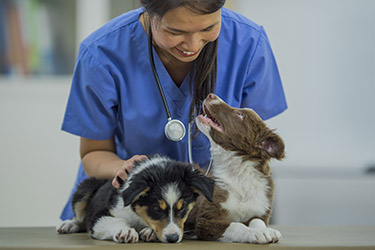Expanding Services in Your Vet Practice

Factors to consider when expanding your veterinary practice
Veterinary practices increasingly face pressure to determine how to generate additional traffic, increase revenue, enhance productivity, improve profitability and become more efficient at providing essential, high-demand services for their clients. To expand or not to expand, that is the question.
Expansion typically takes place in one of three ways — width (the addition of new services), depth (the extension of existing services) or a combination of the two. Deciding which path to pursue involves evaluating where the practice is today and where you want it to be tomorrow.
First, take stock of what services your veterinary practice offers now. Many practices’ service offerings evolved over time without following a well-defined, written strategic plan to get from where you were years ago to where you are today. For example, many veterinary hospitals operate like human hospitals, providing emergency, diagnostic, surgical and medical services to accommodate the needs of a wide sampling of clients.
As recently as the 1980s, this was not always the case. The advent of every human hospital offering 24/7 emergency care is a relatively modern development. It only occurred after administrators saw that 25-30 percent of their inpatient admissions were first arriving at the ER. Only then did they conclude that a fully staffed ER was desirable. The same strategic thinking was applied to advanced diagnostic services (CT, MRI, etc.), especially when the new technology was expensive to purchase.
Generally speaking, this is an inefficient model of debating the merits of new veterinary care because providers are disinclined to stop offering a service they already offer. But, before you make a decision, ask yourself these questions:
- Do you continue a service because you’ve always done it?
- Are you especially adept at a specialized service?
- Is someone else (a boutique provider) better equipped to handle it?
- What are the risks and rewards associated with its discontinuance?
The next consideration involves understanding the principal differences between a veterinary hospital and a free-standing clinic/practice. The former is set up to accommodate more complex cases and provide inpatient or overnight care, specialized (versus generalized) surgery services, emergency care, dental services, and on-site (versus off-site) diagnostic, radiographic, laboratory and pharmacy services. Veterinary hospitals may have the financial resources or space to expand into ever more specialized care, while vet clinics might be more limited in what services they can offer, how much they can afford, or how much space they have to expand.
Clinics, however, are generally better positioned to expand into areas such as advanced grooming, day care, boarding, funeral, transportation, and enhanced merchandising services. That’s because a clinic’s overhead costs are better suited to handle these services for their clientele. While clinics may one day expand into areas now covered by a hospital, that’s more likely to happen downstream.
Keep in mind that just because everyone else seems to be offering some new or improved service does not mean you should be jumping on the bandwagon. A great resource for those considering an expansion of their services is dvm360.com, or by consulting your Covetrus rep to learn more about Vets First Choice, AVImark® or ImproMed® veterinary solutions.
Contact your Covetrus sales representative at 855-724-3461 to learn more about taking your practice to the next level.


Working Here
Our team members are encouraged to be the best they can be... at Covetrus we believe we impact one another.
Learn MoreNews & Events
FDA Cautions Pet Owners Not to Feed Texas Tripe Inc. Raw Pet Food Due to Salmonella, Listeria Monocytogenes
The U.S. Food and Drug Administration is cautioning pet owners not to feed their pets any of the Texas Tripe brand raw frozen pet food listed below because several samples of Texas Tripe raw pet food have tested positive for Salmonella and/or L. mono.
Careers
Are you looking for a place to let your talents shine? At Covetrus, we help our practitioner customers better serve their patients and take pride in providing the best customer experience possible. Search our open positions to see our available opportunities.
Newsletter
Stay current with what’s going on with Covetrus, subscribe to receive our newsletter and email communications. Subscribers will receive the latest information in practice management, sales and marketing, animal health, and more.



-3-(1).png?sfvrsn=2d806d73_0)

Leave a comment